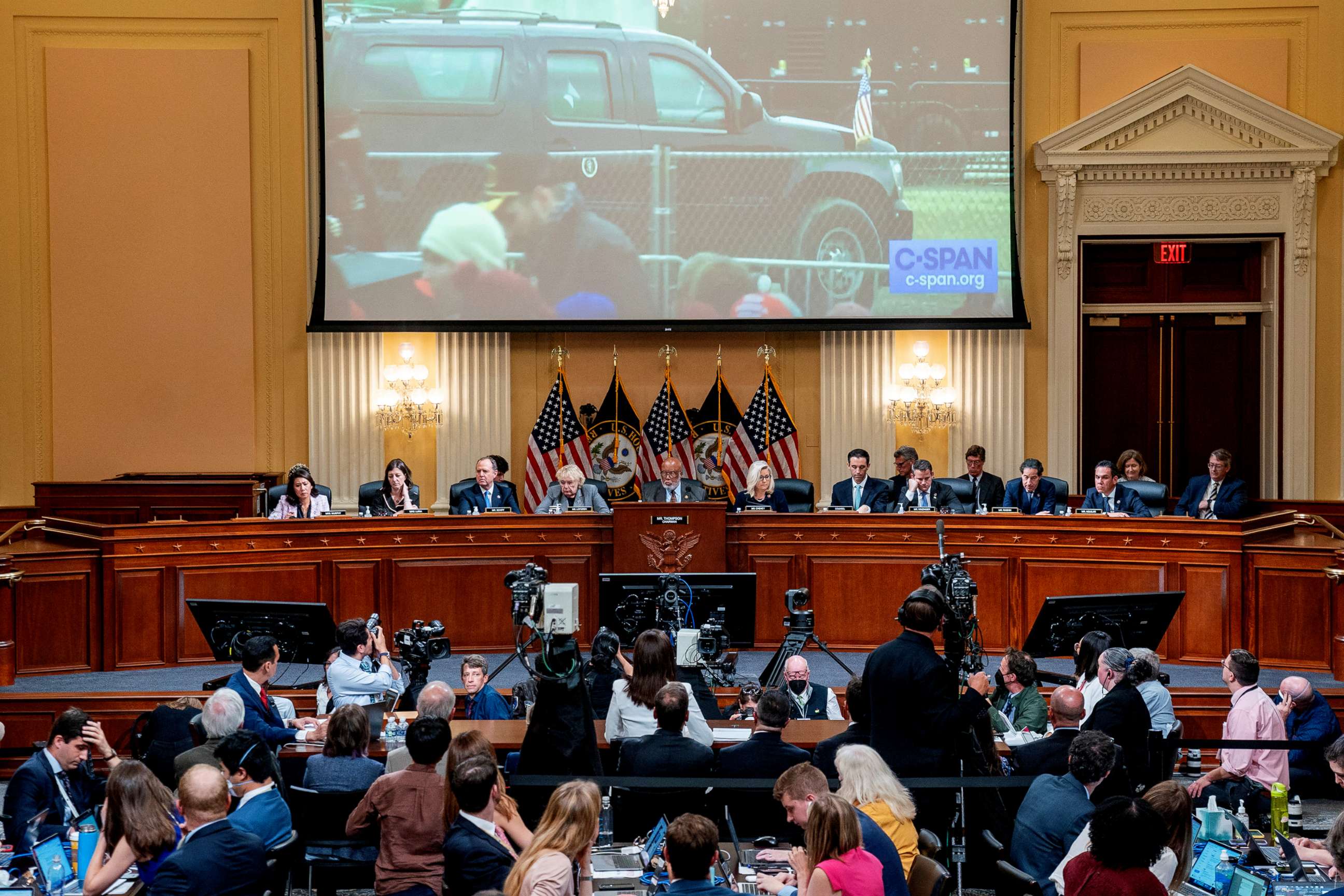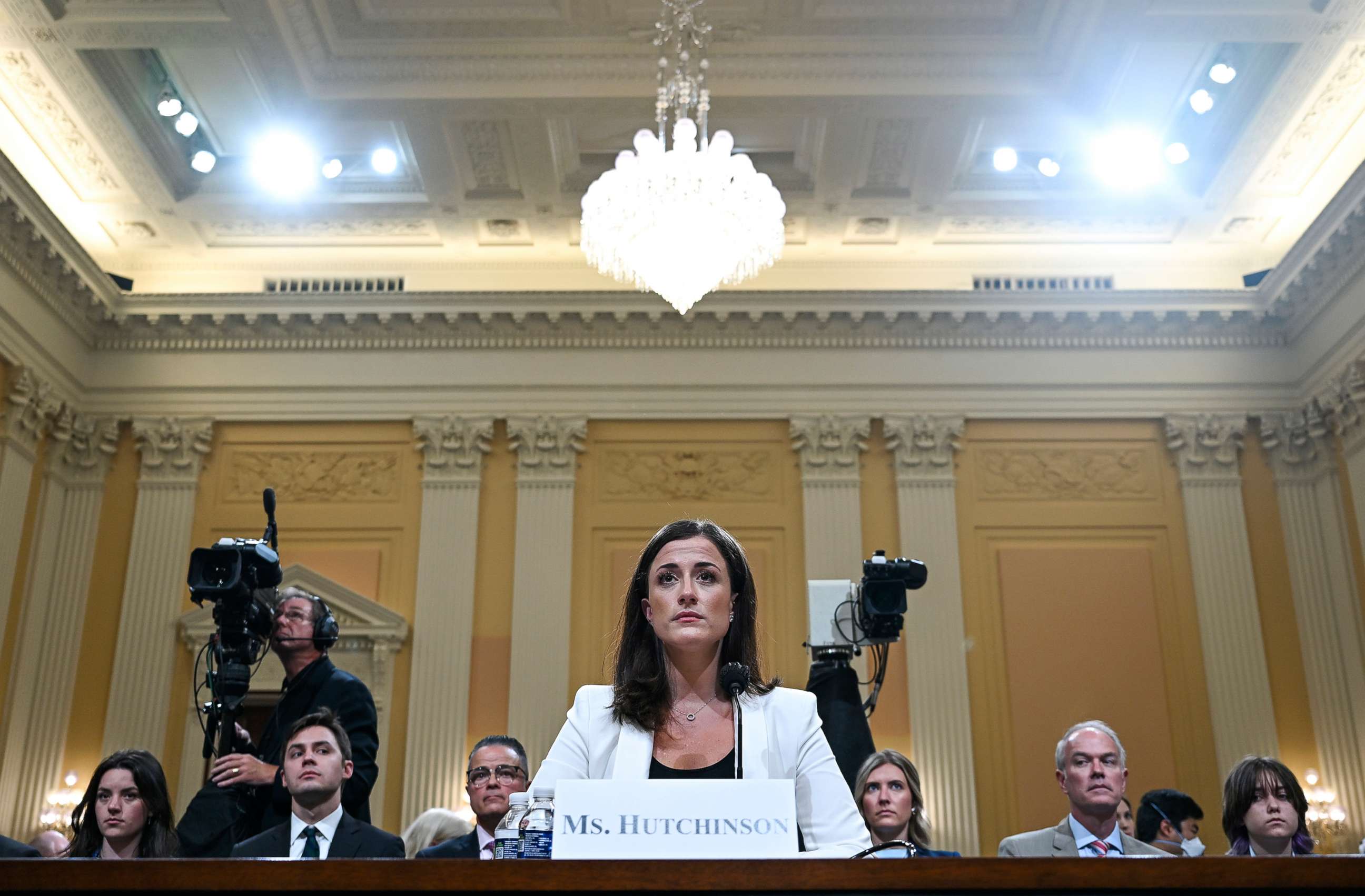Hutchinson's testimony raises fresh questions about Secret Service's handling of Jan. 6
The testimony "raises highly disconcerting questions," says an ex-DHS official.
A former White House aide's stunning testimony before the House panel investigating the Capitol attack indicated that the U.S. Secret Service may have had advanced warning of the potential for violence at the Capitol, raising new questions about the agency's planning ahead of the riot and actions taken by agents on Jan. 6.
Cassidy Hutchinson, a top deputy to then-White House Chief of Staff Mark Meadows, told lawmakers on Tuesday that the security team guarding then-President Donald Trump and senior White House officials were aware there was a serious threat posed by some descending on Washington, D.C., on Jan. 6, when Trump was planning to address a rally to support his baseless accusations that the 2020 presidential election was stolen from him.
In Hutchinson's telling, the agency famous for its teams of bodyguards, sharpshooters and hyper-skilled drivers was aware that among the throngs headed to Washington were some who were planning to carry a variety of weapons and military gear, and were seeking to target members of Congress and breach the Capitol building.
If so, the Secret Service apparently failed to coordinate effectively with law enforcement partners, the public, or congressional leaders to strengthen the security posture -- and instead ferried a number of people under their protection to the Capitol complex with little more than their personal security details.
The Secret Service declined to answer questions from ABC News.
If true, the lapse in security -- laid out on national television during a committee session Tuesday -- represents perhaps the most glaring evidence to date that the Secret Service, responsible for guarding key political figures and their families, failed at its most basic responsibilities in how it dealt with Trump's rally and the meetings of the House and Senate on Jan. 6, according to John Cohen, a former ranking Department of Homeland Security official who is now an ABC News contributor.
"It appears that senior officials at the White House were not only aware of plans to march on the U.S. Capitol, but also appeared to be planning for the president to join," Cohen said, citing another of Hutchinson's allegations. "This testimony raises highly disconcerting questions about what the Secret Service knew about this event and why more wasn't done to prepare."

Notoriously tight-lipped about their job and how they do it, the Secret Service is under renewed focus this week after Hutchison, 26, alleged shocking new details about the president's interactions with his security agents on Jan. 6 and how they were so concerned about possible violence at the Capitol that they refused Trump's directive to drive him there.
"The president said something to the effect of, 'I'm the effing president, take me up to the Capitol now' -- to which Bobby [Engel, the head of Trump's security detail], responded, 'Sir, we have to go back to the West Wing,'" Hutchinson testified she was told by Tony Ornato, a senior Secret Service official who was at the time White House deputy chief of staff for operations.
Trump, responding to Hutchinson's testimony, said, "I hardly know who this person, Cassidy Hutchinson, is, other than I heard very negative things about her (a total phony and 'leaker')."
Hutchinson also testified that in the days leading up to Jan. 6, Meadows at one point said, "Things might get real, real bad on Jan. 6."
And on the morning of Trump's planned speech at the Ellipse, just south of the White House grounds, Hutchinson said, Trump was made aware of individuals with weapons seeking to attend his rally and that many of them declined to pass through security checkpoints because they would have needed to surrender their weapons. Frustrated that those requirements were suppressing the size of the crowd, Trump suggested that the metal detectors be removed, Hutchinson testified.
Cohen said that, as concerned as he was about those developments, he was most troubled by the picture Hutchinson's testimony painted of possible failures on the part of the Secret Service, an agency Cohen has worked closely with since it was folded in to DHS after the 9/11 terror attacks.
"Hutchinson's testimony raises serious questions regarding security planning by the Secret Service on Jan 6. that will need to be answered," Cohen said. "Did the Service leadership have advanced notice of the planned march on the Capitol? Did they have advanced notice of the president's intent to join the crowd?"
Hutchinson said that Ornato, whom she described as "the conduit for security protocol between White House staff and the United States Secret Service," was aware of possible violence planned for Jan. 6 in the preceding days -- and alerted Meadows and Trump on the morning of Jan. 6.
Even with this information allegedly circulating among senior White House staff, the Secret Service ferried at least three of its protectees to travel to the Capitol -- Vice President Mike Pence, Second Lady Karen Pence, and incoming Vice President Kamala Harris, who was still a senator from California -- without supplementing their details with additional agents or coordinating with other agencies to shore up protection.
Ornato, a longtime Secret Service employee, currently serves as a senior official in the agency's training branch. The Jan. 6 committee has expressed interest in interviewing him, and the Secret Service has said he is available to testify under oath, but did not provide further details.

Law enforcement officials have broadly characterized Jan. 6 as an intelligence failure, claiming that Washington's myriad of law enforcement agencies did not fully grasp the threat landscape -- despite warnings that appeared on social media in the weeks leading up the rally.
Secret Service officials have also said that local officials did not ask DHS to establish a special national security designation for the Jan. 6 sessions of Congress, so their hands were tied -- though Cohen said DHS and the Secret Service don't have to wait for local officials to reach out if they are aware of active threats.
Hutchinson's testimony indicated that the Secret Service either had advanced warning of the threats and failed to notify others and formulate an appropriate response plan -- or they were misled by White House officials who had a clearer understanding of the potential for violence and neglected to alert the appropriate agencies, Cohen said.
"These security lapses may not have been a result of incompetence, but instead due to deliberate actions taken by senior White House officials," Cohen said. "If this information was not provided to the Secret Service, or if it was and the Secret Service failed to expand security operations, that would be highly disconcerting."
Don Mihalek, a former senior Secret Service agent who is now an ABC News contributor, said the "interplay of information" among senior White House staff and protective agents about possible threats happens regularly -- but that agents cannot prevent a protectee from doing their job, except in the rare instance of a specific and credible threat.
Mihalek said he believes the breakdown in coordination between agencies handicapped the Secret Service's planning and response as protesters marched on the Capitol building. He defended agents' decision to allow Pence, his wife, and Harris travel freely to the Capitol, despite possibly knowing the risk in advance.
"Nobody has a crystal ball," Mihalek said. "There's always a threat environment, and the Secret Service's job is to mitigate threats as much as possible -- and they don't have the authority to override a protectee's movement, outside of citing a credible and specific threat."
In the wake of her appearance on Capitol Hill, Hutchinson has faced a deluge of criticism from Trump associates and supporters who have questioned her credibility. Republican Rep. Liz Cheney told "This Week" co-anchor Jonathan Karl in an exclusive interview that she has full faith and confidence in Hutchinson's word.
"I am absolutely confident in her testimony," Cheney told Karl in a wide-ranging interview set to air in full on ABC's "This Week with George Stephanopoulos" this Sunday. "The Committee is not going to stand by and watch her character be assassinated by anonymous sources, and by men who are claiming executive privilege."




